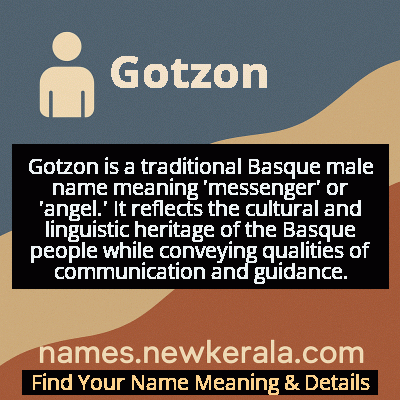Gotzon Name Meaning & Details
Origin, Popularity, Numerology Analysis & Name Meaning of Gotzon
Discover the origin, meaning, and cultural significance of the name GOTZON. Delve into its historical roots and explore the lasting impact it has had on communities and traditions.
Name
Gotzon
Gender
Male
Origin
Basque
Lucky Number
7
Meaning of the Name - Gotzon
Gotzon is a traditional Basque male name meaning 'messenger' or 'angel.' It reflects the cultural and linguistic heritage of the Basque people while conveying qualities of communication and guidance.
Gotzon - Complete Numerology Analysis
Your Numerology Number
Based on Pythagorean Numerology System
Ruling Planet
Neptune (Ketu)
Positive Nature
Intuitive, analytical, spiritual, and inquisitive.
Negative Traits
Secretive, reserved, aloof, and can be overly critical.
Lucky Colours
Green, yellow.
Lucky Days
Monday.
Lucky Stones
Cat’s eye, moonstone.
Harmony Numbers
1, 5, 6.
Best Suited Professions
Scientists, researchers, spiritual leaders, detectives.
What People Like About You
Depth of knowledge, analytical skills, spirituality.
Famous People Named Gotzon
Gotzon Ajuria
Musician
Lead vocalist of the Basque rock band Berri Txarrak
Gotzon Mantuliz
Sports Journalist
Renowned Basque sports commentator and television presenter
Gotzon San Bartolomé
Writer
Basque author known for his contributions to Basque literature
Gotzon Enbil
Religious Figure
Influential Basque priest and cultural promoter
Name Variations & International Equivalents
Click on blue names to explore their detailed meanings. Gray names with will be available soon.
Cultural & Historical Significance
Extended Personality Analysis
People named Gotzon are typically characterized by their strong communication skills and reliable nature, embodying the messenger symbolism of their name. They often display excellent mediation abilities and are skilled at building bridges between different people or groups. Gotzons tend to be culturally aware individuals with deep respect for tradition, yet they also demonstrate adaptability to modern circumstances. Their personality often combines emotional intelligence with practical wisdom, making them effective problem-solvers and trusted advisors. Many exhibit a strong sense of community responsibility and take pride in preserving cultural heritage while navigating contemporary challenges. This balance between tradition and progress, combined with their natural diplomatic tendencies, makes Gotzons valuable contributors to both personal relationships and broader social contexts.
Modern Usage & Popularity
In modern times, Gotzon maintains a stable presence primarily within the Basque Country, where it is valued as a traditional name that reinforces cultural identity. While not among the most popular contemporary names, it enjoys consistent usage among families committed to preserving Basque linguistic heritage. The name has experienced a modest revival in recent decades as part of the broader Basque cultural renaissance movement. Outside the Basque regions, Gotzon remains relatively uncommon, though it appears occasionally in diaspora communities seeking to maintain cultural connections. Its usage patterns reflect a careful balance between honoring tradition and embracing modernity, appealing to parents who want a name that is both culturally significant and distinctive in today's globalized world.
Symbolic & Spiritual Meanings
Symbolically, Gotzon represents the concept of communication as a bridge between different realms—whether spiritual, cultural, or interpersonal. As a 'messenger,' the name embodies the idea of transmitting knowledge, values, and connections across boundaries. It symbolizes reliability in communication and the importance of maintaining cultural continuity through language and tradition. The name also carries connotations of guidance and mediation, suggesting someone who can navigate between different perspectives while maintaining integrity. In a broader cultural context, Gotzon represents the preservation of Basque identity and the transmission of heritage across generations, serving as a living symbol of cultural resilience and the enduring power of linguistic tradition.

